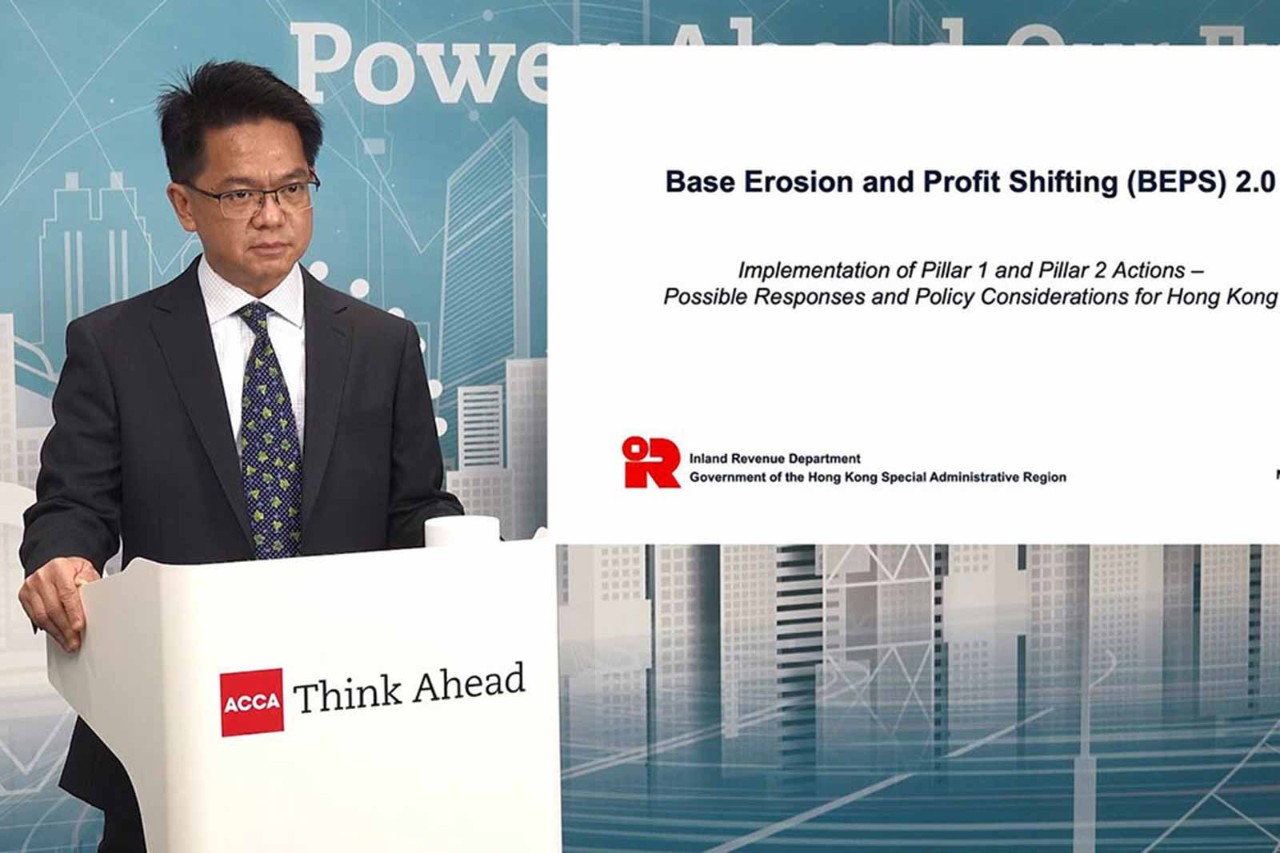

At a time when digitalisation of the economy is creating new tax challenges, ACCA Hong Kong hosted its annual tax conference virtually on 20 March to discuss how tax policies can maintain Hong Kong’s unique advantages and promote business development.
Themed ‘Tax Reform in the World of BEPS 2.0 Framework’, the conference focused on the Pillar One and Pillar Two Blueprints for the base erosion and profit shifting (BEPS) 2.0 project issued by the Organisation for Economic Cooperation and Development (OECD), which will change the allocation of taxing rights of jurisdictions and require multinational enterprises to pay a minimum tax on business revenue.
An externally oriented economy deeply entrenched in the global network, Hong Kong is poised to overhaul its tax regime to embrace BEPS 2.0.
During the conference, Tam Tai-pang FCCA, Hong Kong’s Commissioner of Inland Revenue, gave an overview of BEPS policy; Wilson Chong, Hong Kong General Chamber of Commerce’s senior economist, discussed the post-Covid-19 economy; and finance leaders debated how BEPS 2.0 will impact businesses in the Special Administrative Region (SAR).
Staying competitive
‘Today’s conference will draw us together to discuss international tax development and how tax policies can keep Hong Kong globally competitive, improve the local business environment and attract more multinational enterprises to invest and operate in Hong Kong,’ said Ernest Wong FCCA, ACCA Hong Kong chairman, in his welcome address.
BEPS 2.0 is a key focus of discussion and Hong Kong’s government is considering measures to address its impact.
‘As an international financial centre and a trade and commerce hub, I believe Hong Kong will actively implement BEPS 2.0 according to the international consensus, while keeping the tax regime simple and fair,’ Wong concluded.
Tam described Hong Kong’s possible responses and considerations to Pillar One and Pillar Two requirements. The implications of BEPS 2.0, he said, could undermine Hong Kong’s competitiveness, which is partly attributable to its low tax environment.
There are views, he noted, that the SAR should review its profits tax regime. Meanwhile, an advisory panel has been set up by the government to look into implementing BEPS 2.0.
Hong Kong will actively implement BEPS 2.0 according to the international consensus, while keeping the tax regime simple and fair

SME focus
‘Hong Kong will strive to minimise the impact on local small and mid-size enterprises where possible, and maintain the simplicity, certainty and fairness of Hong Kong’s tax regime, minimising the compliance burden on affected corporations while safeguarding Hong Kong’s taxing rights,’ said Tam.
On a separate note, Hong Kong’s economic recovery from the pandemic is likely to be bumpy, Chong warned in his overview. He also offered insights in a Q&A session moderated by Stanley Ho FCCA, co-chairman of ACCA Hong Kong tax sub-committee.

Growth opportunities
Thanks to the roll-out of a mass vaccination programme and a low-base effect, Chong expects Hong Kong’s economy will grow by 3.5% this year to return to its 2019 size and that the unemployment rate will drop to 4.8% by the end of 2021.
The pandemic, he said, has provided an opportunity for Hong Kong to transform.
‘The global landscape and the macroenvironment have changed,’ Chong said, adding that the pandemic has highlighted the SAR’s imbalanced economic structure and that rethinking about Hong Kong’s role is needed. Technology, in this case, could help boost productivity growth.
In the final session, moderated by ORI Capital partner Dicky To FCCA, BEPS 2.0’s impact on businesses was discussed by finance leaders including Vincent Fung, the then Europe tax lead at PCCW Global; Cecilia Lee, partner in transfer pricing services at PwC China/Hong Kong; Andy Li FCCA, CFO at Crystal International Group; and Jack Lo FCCA, head of tax of Asian markets at AXA Asia.
Multinational enterprises, which BEPS 2.0 targets, are expected to see heavier tax burdens, extra compliance costs and more tax disputes. All businesses, not just e-commerce players, should also pay attention to BEPS 2.0, the panellists urged.
They advised finance professionals to understand the policy and conduct a preliminary impact assessment.
‘You may use the financial information currently available to perform impact assessment of Pillar One and Pillar Two to get a feel of BEPS 2.0,’ Lee concluded.




